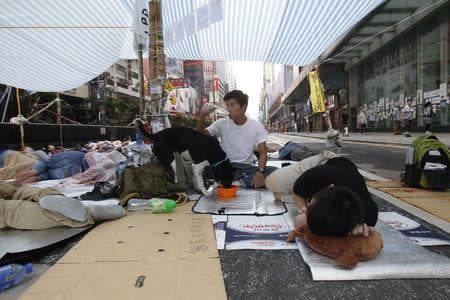Generational divide plays out in Hong Kong as political tensions rise

By Irene Jay Liu HONG KONG (Reuters) - As Hong Kong's political crisis escalates, both the students and government are grappling with a generational conflict that is playing out on the streets and at dining room tables across the city. Many young protesters talk of fighting for "Hong Kong people", but they face a challenge in convincing the older generation to take up their cause. Hundreds of protesters regrouped in central Hong Kong on Friday to push their call for democracy, a day after the government called off talks with students aimed at defusing a two-week standoff that has shaken communist China's capitalist hub. "My parents think our generation is just coming out to make chaos, to mess around, not to contribute to society," said Marcus Fu, a 23 year-old political science student at City University of Hong Kong who was born to emigres from mainland China. "They think the government is right, or even if it isn't, they don't have the power to change anything. They were raised to believe in and respect authority. They think democracy is useless, and that it will hurt the economy." Others feel many of the older generation are reluctant to do anything to threaten stability. "They say, 'we have the police to protect us, the transport system is good'," said Pinki Chan, 25, an advertising editor who huddled with her friends at one protest site late on Thursday. "They are looking for a stable life, when the basic needs are satisfied. Our generation, we are fully fed – we are looking for more," said 25-year-old office worker Yen Choi. The government is dealing with a generation that has less trust in the leadership than its parents, many of whom were born under British colonial rule before Hong Kong returned to China in 1997 under a formula of "one country, two systems". "We are part of China, but we love our freedom of speech and protest. Today, I'm sitting here doing an interview, but tomorrow I could disappear. That happens in China all the time. We don't want that to happen here," Choi said. According to a September poll of 1,000 people by the University of Hong Kong's Public Opinion Programme, only 11 percent of respondents between the ages of 18 and 29 said they had confidence in the "one country, two systems". And only 15 percent said they were satisfied with the government's handling of its relationship with Beijing. While overall attitudes towards Hong Kong's political system, government and its dealings with Beijing are generally pessimistic – only one-third voiced satisfaction with Hong Kong's relationship with the mainland – the younger generation has grown increasingly alienated, according to HKU. "I think the Hong Kong people want to trust the government, but it always breaks its promises - such as today," Choi said, referring to the government's abrupt cancellation of talks with student leaders on Thursday. And recent history has only emboldened the protesters' belief that civil disobedience can achieve results. In 2012, students spearheaded massive protests to protest the implementation of a "patriotic" national curriculum in Hong Kong's schools, plans that were eventually shelved by the government in the face of mounting public pressure. "Before the protests, the older generation thought there were only two kinds of young people – the ones who work hard and get a good job, and the 'hey' - Hong Kong slang for the do nothing, think nothing, no aim," Choi said. "Now, everyone knows the students have power. Otherwise, the government would not consider negotiating." ^^^^^^^^^^^^^^^^^^^^^^^^^^^^^^^^^^^^^^^^^^^^^^^^^^^^^^^^^^> Graphic http://graphics.thomsonreuters.com/14/hk/index.html ^^^^^^^^^^^^^^^^^^^^^^^^^^^^^^^^^^^^^^^^^^^^^^^^^^^^^^^^^^> (Reporting by Irene Jay-Liu; Editing by Nick Macfie)

